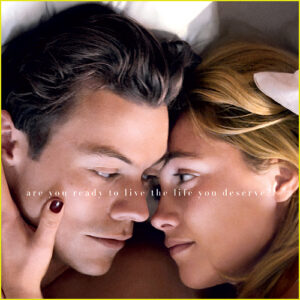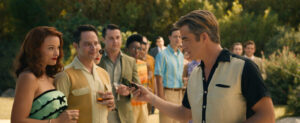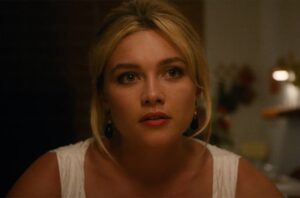Directed by Olivia Wilde | Written by Katie Silberman, Carey Van Dyke, and Shane Van Dyke | 123 min | ▲▲▲▲▲ | Netflix
It’s been a long time since a feature arrived in cinemas more freighted in tabloid rumour and production scuttlebutt. It’s been hard to avoid tales of the former cast member sent packing, the romance between the director and her leading man, the falling out between the director and her leading lady, and so on. All of it the stuff of internet chatter and so little of it worthwhile or even based in truth, largely driven by sexism.
None of the unwelcome noise detracts from the film’s quality. The filmmaker whose first effort was the delightful Booksmart has once again delivered an excellent picture — this one both a terrific political parable and a fascinating mystery.
It welcomes us to Victory, a planned community somewhere in the desert, somewhere in the late-1950s, early-1960s. It’s that American suburban ideal of a more conservative age where the men wake to coffee and eggs and bacon breakfast prepared by their wives who send the men on their way to work while they spend the day cleaning, shopping, and drinking cosmos around the pool.
Alice (Florence Pugh, forceful) and Jack (Harry Styles) are newish arrivals but very much already a part of the community, especially friendly with the scathing Bunny (director Wilde) and her husband, the weaselly Dean (Nick Kroll). Victory and its adjacent employer are led by Frank (Chris Pine, smooth, making for an Outlaw King reunion), who has a genuine cult-leader vibe, with his imperious wife, Shelley (Gemma Chan), on his arm.
What all the men actually do when they go to their jobs outside the compound is part of the mystery here. Why are the women prohibited from leaving? And why is Alice’s friend, Margaret (Kiki Layne), behaving so strangely? Does it have something with her walk out into the desert?
The ratcheting of paranoia in tandem with Alice’s psychedelic visions is what works best, all driven by Pugh’s commitment — there’s never a moment when we’re not on her side, not asking all the same questions she is. As with all of her performances lately, she’s impossible to look away from.
Full marks to Wilde’s set- and costume-design team, as well as the sound and editing department — I’m a particular fan of the motorcycle revving as anxiety-building noise — and like Booksmart we get another perfectly chosen soundtrack of songs to evoke the era. The references I saw to films like The Stepford Wives and The Truman Show and Under The Skin, and the series Black Mirror, are subtle enough not to be outright homages while also clear enough to show where Wilde and her collaborators’ heads are at.
Of the mixed reviews I’ve read around this film, a few folks have taken shots at Styles, who is actually fine. He’s not the star of the thing — he just needs to be charming and fetching, both of which he accomplishes without breaking a sweat.
I’ve also read a few reviews saying the film doesn’t stick the landing, that the final act diminishes what went before. Without spoiling the ending, I’ll just say it totally worked for me. The conceit is very much in my genre wheelhouse even as I didn’t see it coming.
It’s not a perfect movie — where a few plot threads are left dangling — but it is an extraordinarily well-constructed one, a pleasure to live in. It crystalizes a certain anxiety from a women’s perspective. I wouldn’t call it a horror movie, but the argument could be made.
As a broad allegory, Don’t Worry Darling is right on the money. I can’t think of another recent movie more astute as a critique of toxic male systems and conservative thought. It’s a nightmarish vision of a far-right wet dream and the way some men still think about women’s roles in society. While it’s not quite as powerfully ambiguous as Nope, it compares favourably to Jordan Peele’s summer blockbuster, and especially to his first film, the Oscar-winning Get Out, with which it shares some structural similarities.
Wilde and Peele are Hollywood filmmakers using genre to comment on our culture in ways people will be talking about years from now. Hopefully people will forget all the gossipy bullshit in favour of what this picture accomplishes.













